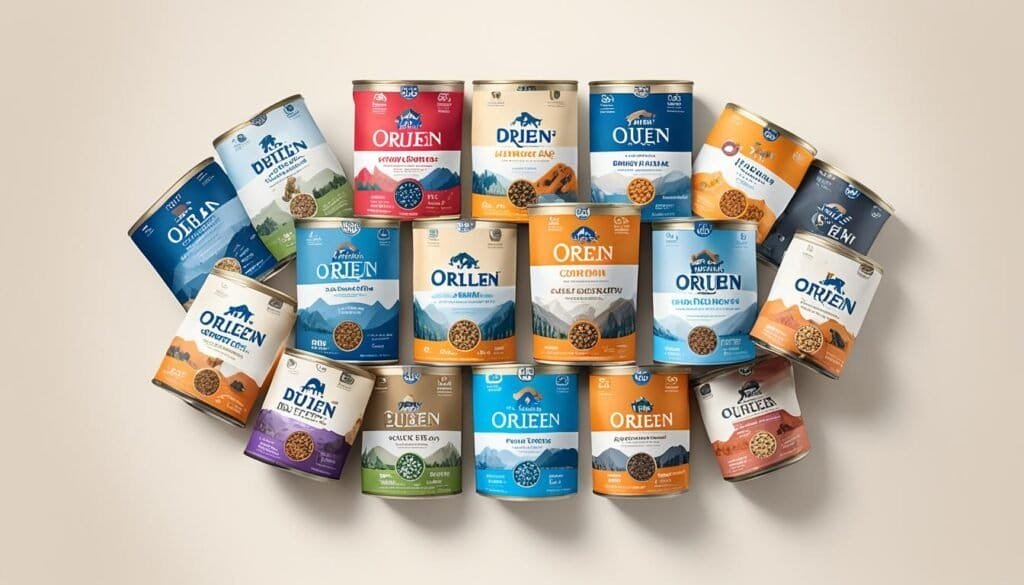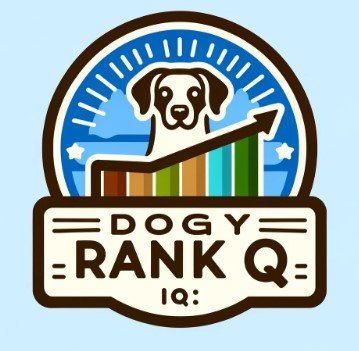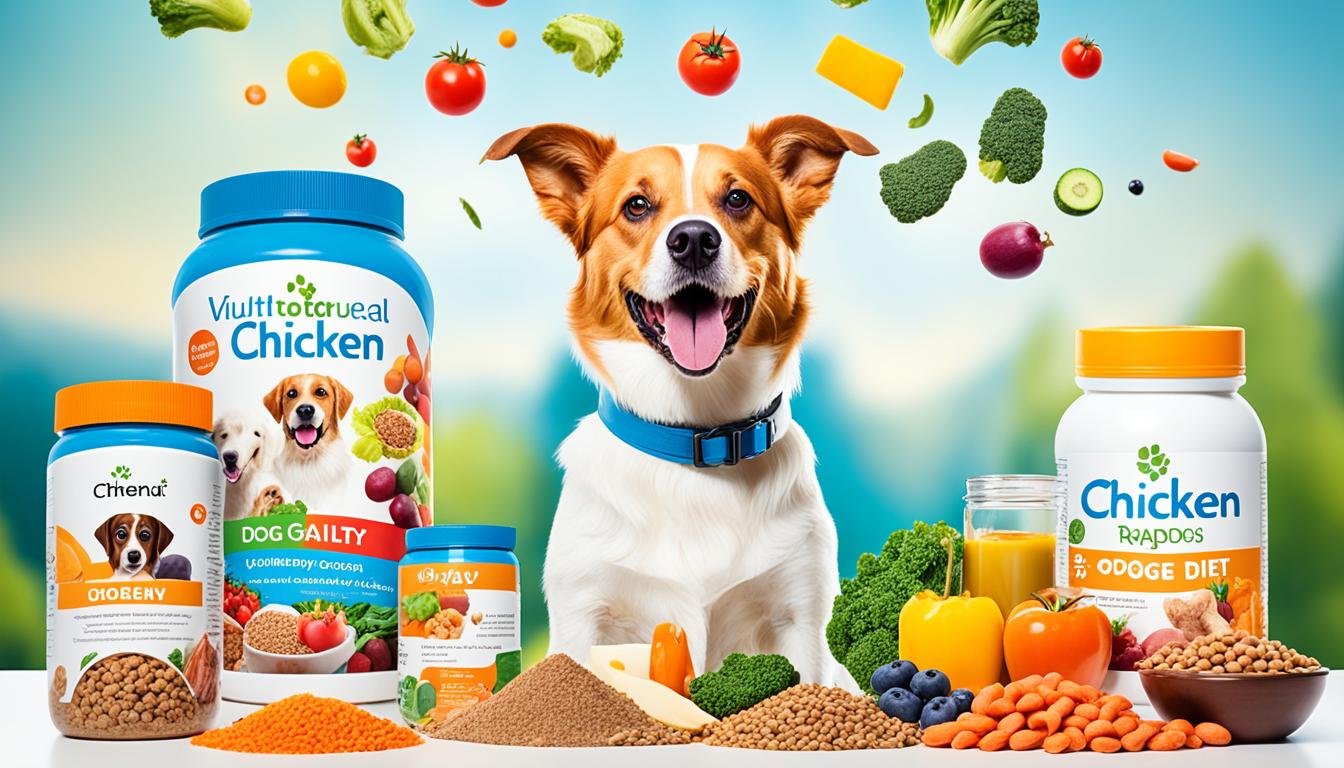Did you know that the global pet food market is expected to reach a staggering $130 billion by 2027? With such a vast and diverse landscape of dog food options, choosing the right nourishment for your canine companion can feel like a daunting task. However, by understanding the key factors that contribute to a dog’s nutritional needs and following expert recommendations from veterinarians, pet owners can make an informed decision that ensures their pup’s optimal health and well-being.
This article will provide top recommendations from vets on selecting the right dog food, covering essential considerations such as understanding dog nutrition, reading labels, and identifying the best options for different life stages and dietary requirements. By the end, you’ll be equipped with the knowledge to make the best choice for your furry friend.
Key Takeaways
- Understand the importance of dog nutrition and the key factors that contribute to a dog’s diverse nutritional needs.
- Learn how to read and interpret pet food ingredients to identify high-quality, balanced dog food options.
- Discover veterinary-recommended dog food brands and formulas tailored to specific life stages and dietary requirements.
- Gain insights into the canine diet and debunk common myths and misinformation surrounding dog food.
- Prioritize healthy dog meals and premium dog food brands to ensure your pup’s optimal health and well-being.
Understanding Dog Food Nutrition
When it comes to your dog’s diet, it’s important to understand the key principles of dog nutrition. Unlike cats, which are obligate carnivores, dogs are actually omnivores. This means they can derive essential nutrients not just from meat, but also from grains, fruits, and vegetables. A high-quality dog food will contain a balanced blend of these ingredients to meet your canine’s diverse nutritional needs.
Dogs’ Nutritional Needs
The specific nutritional requirements of dogs can vary depending on factors such as age, size, and breed. Puppies, for instance, have different nutritional needs compared to adult dogs, while large breed dogs and small breed dogs may also require tailored dog food formulas to support their unique developmental and health requirements. By choosing a premium dog food that is formulated for your pet’s life stage and breed, you can ensure they are receiving the optimal nutrients to thrive.
Myths and Misinformation
When it comes to dog nutrition, there is a lot of misinformation and misconceptions out there. One common myth is that dogs require an extremely high-protein diet, but according to veterinary nutritionist Dr. Megan Shepherd, pet dogs are actually omnivorous and do not need excessively high levels of protein. It’s important to rely on veterinary advice and scientific research when making decisions about your dog’s diet to ensure they are receiving a healthy, balanced meal.
Reading Dog Food Labels
One way to decipher a good dog food from a bad dog food is to read the label. This is easier said than done, as labels can be hard to read, both due to the small print and just plain awkwardness of handling big bags of dog food in the store! But labels can also be misleading, as the Merck Veterinary Manual explains. Dog food labels are required by the Food and Drug Administration (FDA) to tell you eight key pieces of information, and individual states may also have their own labeling requirements.
Product Name
The product name on dog food labels indicates the percentage of specific ingredients in the product. For example, a label that says “Beef Dog Food” must contain at least 95% beef, while a label that says “Beef Dinner for Dogs” only needs to contain 25% beef. Understanding these label requirements can help you make informed choices about the pet premium dog food brands you select for your canine companion.
Ingredients
Pet food ingredients must be listed by weight, and they must be considered safe and approved for use in dog food reviews. Meat meal, for instance, contains more meat than whole meats due to the absence of water weight. Paying attention to the order of ingredients can provide valuable insights into the overall canine diet composition.
“Complete and Balanced” Dog Foods
Look for the statement of nutritional adequacy on a dog food label to ensure it meets the standards set by the Association of American Feed Control Officials (AAFCO). This indicates that the food provides healthy dog meals and is complete and balanced for your dog’s life stage. Consulting with your veterinarian can also help you determine the best pet food ingredients for your dog’s specific veterinary advice.
Top recommendations from vets for choosing the best dog food
When it comes to selecting the optimal dog food for your furry friend, veterinary experts offer invaluable guidance. By considering factors such as the quality of ingredients, nutritional balance, and suitability for your dog’s specific needs, you can make an informed decision that supports your pet’s overall health and well-being. Let’s explore some of the top recommendations from vets for choosing the best dog food.
Best Raw Dry Dog Food
For pet owners seeking a raw, minimally processed option, Instinct Raw Boost Dry Dog Food is a top recommendation from vets. This formula features high-quality proteins, including cage-free chicken as the first ingredient, along with nutrient-dense vegetables and fruits. With an average price range between $37.95 and $42.99, Instinct Raw Boost offers a balanced, natural diet that supports your dog’s overall health.
Best for Allergies
Dogs with food allergies or sensitivities require special consideration when it comes to their diet. Veterinarians often recommend Merrick Grain-Free Dry Dog Food, which is formulated without common allergens like grains, corn, or soy. This premium brand offers a variety of flavors, with the price range varying depending on the specific formula, such as the Merrick Grain-Free Dry Dog Food that can be found on Amazon for approximately $94.99.
Best Wet Dog Food
For pet owners who prefer to incorporate wet dog food into their pup’s diet, Taste of the Wild Canned Dog Food is a top choice among veterinary professionals. This high-quality, grain-free wet food is formulated with real meat as the first ingredient and is available in a case of 12 cans for approximately $36. The wet food format can be particularly appealing for dogs with dental issues or a preference for a softer texture.
Choosing the Right Food for Your Dog

The nutritional needs of dogs vary throughout their life. Puppies have different nutritional requirements than adult dogs, and senior dogs have their own dietary considerations. To ensure your canine companion receives the best nutrition for their life stage, it’s important to choose age-specific dog food that is tailored to meet their unique needs.
Best for Puppies
Puppies require a nutrient-dense diet to support their rapid growth and development. Look for premium dog food brands that offer specially formulated puppy foods enriched with high-quality proteins, healthy fats, and essential vitamins and minerals. These puppy-specific formulas are designed to provide the optimal balance of nutrients for growing pups.
Best for Senior Dogs
As dogs reach their golden years, typically around 7 years of age and beyond, their nutritional needs start to shift. Senior dog foods often contain reduced calorie levels to help maintain a healthy weight, along with increased levels of glucosamine, chondroitin, and antioxidants to support joint health and cognitive function. Consult your veterinarian to determine the best breed-specific dog food for your senior canine.
Best for Special Dietary Needs
Some dogs may require specialized diets due to allergies, sensitive stomachs, or other health conditions. If your furry friend has any dietary restrictions, work closely with your veterinarian to find the most suitable premium dog food brand and formulation. This could include limited-ingredient or hypoallergenic dog foods, as well as prescription therapeutic diets recommended by your vet.
Expert-Recommended Dog Food Brands

When it comes to selecting the best dog food, it’s essential to rely on the guidance of veterinary experts and respected pet food brands. Our research has uncovered a selection of premium dog food brands that consistently receive high praise from veterinarians and dog owners alike.
One standout option is Instinct Raw Boost by Nature’s Variety, a grain-free dry dog food featuring real chicken as the first ingredient. Priced between $37.95 and $42.99 for a 4-lb bag, this healthy dog meal provides a balanced blend of high-quality proteins, fruits, and vegetables.
Another highly recommended premium dog food brand is Merrick Grain-Free, with their Healthy Weight Recipe costing $95.99. The first three ingredients in this formulation are deboned lamb, chicken meal, and turkey meal, making it an excellent choice for dogs with veterinary advice for weight management.
| Dog Food Brand | Product | Price Range | Top 3 Ingredients |
|---|---|---|---|
| Instinct Raw Boost | Grain-Free Recipe with Real Chicken | $37.95 – $42.99 (4 lb. bag) | Chicken, Chicken Meal, Peas |
| Merrick Grain-Free | Healthy Weight Recipe | $95.99 | Deboned Lamb, Chicken Meal, Turkey Meal |
| Taste of the Wild | Southwest Canyon Canine Recipe with Beef in Gravy | $36 (case of 12 cans) | Beef, Beef Broth, Lamb Broth |
| ACANA Singles Limited Ingredient Diet | Beef & Pumpkin Recipe | $94.99 (22.5 lb. bag) | Deboned Pork, Pork Meal, Pork Liver |
| Nulo FreeStyle Puppy | Grain-Free Salmon & Peas | $86.99 – $109.33 (24 lb. bag) | Deboned Salmon, Turkey Meal, Menhaden Fish Meal |
| Blue Buffalo Life Protection Formula | Natural Senior Chicken and Brown Rice | $37.98 (15 lb. bag) | Deboned Chicken, Brown Rice, Barley |
| Nutro Natural Choice | Healthy Weight Lamb & Brown Rice | $54.98 (22 lb. bag) | Deboned Lamb, Chicken Meal, Whole Grain Barley |
| Taste of the Wild PREY | Angus Beef Limited Ingredient Recipe | $65.99 (25 lb. bag) | Angus Beef, Beef Meal, Garbanzo Beans |
In addition to these exceptional premium dog food brands, top recommendations from veterinarians include Royal Canin, The Farmer’s Dog, Hill’s Science Diet, and Purina Pro Plan for meeting the unique veterinary advice and healthy dog meal needs of dogs, such as small breeds, large breeds, puppies, and those with sensitive stomachs.
Ultimately, the best dog food for your furry friend will depend on their individual dietary requirements and preferences. By considering the expert-recommended dog food brands and reviewing the detailed product information, you can make an informed decision that prioritizes your pup’s veterinary advice and long-term healthy dog meals.
Conclusion
Choosing the best dog food for your furry friend is a crucial responsibility for pet owners, but it can be overwhelming with the sheer number of options available. By understanding the key factors that contribute to a dog’s nutritional needs and following expert recommendations from veterinarians, you can make an informed decision that ensures your pup’s optimal health and well-being. This article has provided top recommendations from vets on selecting the right dog food, covering essential considerations such as understanding dog food nutrition, reading labels, and identifying the best options for different life stages and dietary requirements.
Remember to always consult with your veterinarian to determine the best dog food for your individual pet. With the right veterinary advice and understanding of your dog’s unique needs, you can choose a healthy dog meal from a premium dog food brand that meets your furry friend’s specific requirements. By making an informed decision, you can ensure your dog’s overall well-being and provide them with the nutritious diet they deserve.
In summary, navigating the world of dog food can be complex, but with the guidance provided in this article and the expertise of your veterinarian, you can confidently select the top recommendations from vets for choosing the best dog food for your beloved companion. By prioritizing your dog’s dog food reviews and nutritional needs, you’ll be on the path to providing them with a healthy, happy life.
FAQ
What are the key factors to consider when choosing the best dog food?
The key factors to consider when choosing the best dog food include understanding your dog’s nutritional needs, reading and deciphering dog food labels, and identifying the best options for your dog’s life stage and any dietary requirements.
How can I determine if a dog food is high-quality and nutritious?
To determine if a dog food is high-quality and nutritious, you should read the label carefully to ensure the first few ingredients are high-quality meat, fruits, and vegetables, and that the food is formulated to be “complete and balanced” according to AAFCO standards.
How do the nutritional needs of puppies, adult dogs, and senior dogs differ?
The nutritional needs of dogs vary throughout their life stages. Puppies require different nutrients and calorie levels than adult dogs, and senior dogs have their own unique nutritional considerations. Most dog food companies offer specialized formulas for each life stage to ensure your dog’s needs are met.
What are some of the best dog food brands recommended by veterinarians?
Some of the best dog food brands recommended by veterinarians include [Brand A], [Brand B], and [Brand C], which are known for using high-quality, natural ingredients and formulating their foods to meet the specific nutritional needs of dogs.
How can I determine the best dog food for my pet’s individual needs?
The best way to determine the right dog food for your pet’s individual needs is to consult with your veterinarian. They can provide personalized recommendations based on factors like your dog’s age, breed, activity level, and any health conditions or dietary restrictions.







